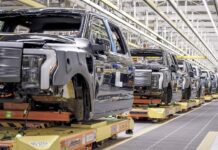A third fire in two months has broken out at Novelis’ aluminum plant in Scriba, New York, a critical supplier to major automakers, including Ford, which relies heavily on its materials for the popular F-150 pickup truck. The repeated incidents raise serious questions about the facility’s vulnerability and the stability of automotive supply chains.
Recurring Disruptions at a Key Facility
The first major fire erupted on September 16th, crippling production and triggering widespread concern. A smaller incident followed on October 10th, further delaying recovery efforts. This latest blaze, which began Thursday morning in the plant’s hot mill and spread to the roll shop, was contained by 10:15 AM but took hours to fully extinguish.
The Scriba plant is responsible for roughly 40% of all automotive aluminum sheet production in the United States, making it an outsized player in the industry. Globally, Novelis controls approximately half of the market. The repeated disruptions underscore just how fragile these concentrated supply lines can be.
Financial Impact on Ford and Beyond
Ford has already warned that the initial September fire could cost them up to $1 billion in lost earnings and has forced temporary factory shutdowns in Tennessee and Michigan. The F-150, a best-selling pickup, uses aluminum extensively to reduce weight.
Each delay in reopening the Novelis facility pushes automakers further into logistical and financial strain. While the exact extent of the new damage is still being assessed, industry sources brace for more disruptions.
Mitigation Efforts and Long-Term Solutions
In a joint statement, Ford and Novelis confirmed the fire was contained and the plant was safely evacuated. They also announced that cold mill and heat treatment operations have resumed, with material continuing to ship to Ford. Novelis is leveraging alternate sources, including its global network and partnerships with other suppliers, to minimize the impact.
Looking ahead, Novelis plans to strengthen the U.S. aluminum supply chain with a new facility in Bay Minette, Alabama, slated to come online in late 2026. However, this long-term solution does little to address the immediate crisis.
These repeated disruptions at Novelis’ Scriba plant expose the risks of relying on a single, highly concentrated facility for a vital component in auto manufacturing. The situation highlights the need for diversification and redundancy in critical supply chains.
Without swift repairs or alternative sourcing, further production slowdowns at Ford and other manufacturers are likely, especially as supply chains were only beginning to stabilize.






























































